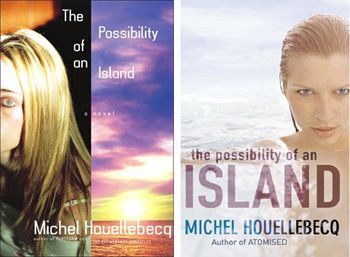 It’s been four months since the French writer Michel Houellebecq’s latest novel, The Possibility of an Island, was released in English, and eight years since his first novel Whatever appeared on the scene.
It’s been four months since the French writer Michel Houellebecq’s latest novel, The Possibility of an Island, was released in English, and eight years since his first novel Whatever appeared on the scene. In that time he’s managed to make quite a bad boy image for himself, primarily by the excoriating insults in his novels (in Platform a character asserts that Islam “could only have been born in a stupid desert, among filthy Bedouins who had nothing better to do — pardon me — than bugger their camels.”)
In addition, he’s managed to act like an ass in person, even in his own documentary (in one interview he got smashingly drunk and demanded sex from the female interviewer, and in his documentary he’s always alone, swigging off a bottle.)
But not since Camus has a French novelist received such widespread popularity, and the sales come partially because of his willingness to sacrifice every sacred cow. He debases women (only slightly more often than men), critiques religions (especially Islam), and offers a selfish, despairing view of the world, but that’s precisely what people find attractive about him. His ideas are attractive because he tries so hard to be unattractive. His ideas are also attractive because no one else is saying them.
He’s been characterized wrongly as a nihilist. It’s simply not true, and what disproves it are two books that form the pillars of his work. The Elementary Particles, which was his first big hit, and his last book, The Possibility of an Island. These two books are hitting on the same theme: that technology cannot save us, and we should return to a primal state.
This repeated theme (among many other reasons) is why he’s called a novelist of ideas. Platform and Whatever are minor books, deserving a reading only if you’re a die-hard fan, but if you want the heart of this misanthropist, read the two pillars. He’s acerbic, difficult to swallow, and often offensive, but his original training in poetry comes through in well crafted prose and his ideas, told entertainingly, should be dealt with.
